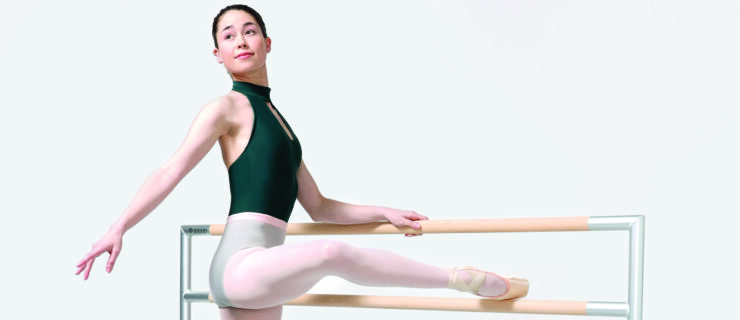Making Time for Musicals
Picture this: Your high school drama club is about to do West Side Story, and you know you’re destined to follow in Chita Rivera’s footsteps as Anita. But you’re already locked into a crazy-full dance schedule with your studio. Will the musical’s director respect your commitment to dance? Will your studio teachers understand your desire to sing and act? And how in the world will you make time for friends, homework—even sleep?
Don’t give up on your musical theater dreams! Doing both is possible. But pulling off double duty won’t happen without some serious planning, compromise and a lot of sweat. Dance Spirit talked to dance teachers, musical directors and a few pros who’ve made it work to get their tips for aspiring triple threats.
Katie Wesler (wearing blue scarf) in Music Theater Wichita’s 42nd Street (© Christopher Clark Photography, courtesy of Music Theatre Wichita)
Get Organized
Before you even think about auditioning for the musical, do a little research and compare its schedule to your dance studio’s. Generally, musical theater rehearsals happen directly after school, so you may be able to make it to dance classes later in the evening. “I ask students to find out as much logistical information as they can so they can make smart decisions,” says Denise Latimer, director of DanceMakers of Atlanta.
Don’t forget to factor in the time spent commuting, and be honest with yourself about your workload outside of the studio. “Remember that your dance or theater work doesn’t end when you walk out of class or rehearsal,” says Katie Wesler, a graduate of University of Cincinnati College-Conservatory of Music, who juggled dance and musical theater in high school and is now performing professionally. “You’ll still have lines to memorize and steps to polish.” That’s in addition to your homework and chores, too.
Talk It Out
The sooner you go to teachers and directors to explain your situation, the more likely it is they’ll be willing to help. And they’ll trust your decisions more if you bring them solutions—planned schedule adjustments, makeup class suggestions, etc.—instead of just conflicts. Wesler says she got teachers on board by laying out how both commitments supported her long-term plans. “Explain that each area helps you in the other,” she says. “Dance training helped me get roles in professional shows, and training in acting helped my concert dance work.”
In fact, studio teachers may see many benefits from your added interest. “Musical theater teaches dancers performance quality,” says Brian Young, director of Sweatshop in Denver, CO. About 60 percent of Young’s company dancers participate in high school musicals. “I don’t let them skip much, and they have to make up all missed classes. But if students collaborate with me, it works.”
Stevi Marks, who’s been directing high school and professional musicals for over 35 years in Illinois, says she’s willing to make some sacrifices in order to include strong dancers in dance-heavy shows. “My job is to get the best possible cast,” Marks says. “I’m willing to compromise with dancers who come to me and say honestly, ‘Dance is my priority, but I’d like to be in this musical.’ ”
Take Care of Yourself
If you do end up doing both, taking care of your body is crucial. Broadway dancer Gabrielle Ruiz learned that the hard way in high school, when an injury derailed her commitments to both dance and musical theater. “I was so tired, but I pushed myself anyway. I slipped in rehearsal and broke my foot,” she says. “Instead of saying ‘no’ to one thing, I was out of everything for five months.”
Listen to your body—and make sure to eat well and get enough sleep. “You have to take breaks even though you don’t want to,” Young adds. “And if you feel exhausted or burned out, you need to communicate that to your teachers.”
Know When to Say No
Big roles in school musicals have much larger rehearsal loads than smaller ones—so pick parts strategically on audition day. Instead of going out for leading lady Laurey in Oklahoma!, for example, it might be smarter to set your sights on her dancing alter ego, Dream Laurey, who’s only in one scene.
The hard truth is that sometimes it might not be possible to take on everything—and that’s OK, too. Wesler, who’s now a swing on Pippin’s national tour, remembers having to skip her studio’s holiday recital one year to focus on musical theater rehearsals. And Ruiz passed on her high school’s production of Little Shop of Horrors during her senior year to make time for college auditions. (It paid off—she ended up at the prestigious Oklahoma City University.) “Whatever you decide,” Latimer says, “you have to commit to it fully.”



